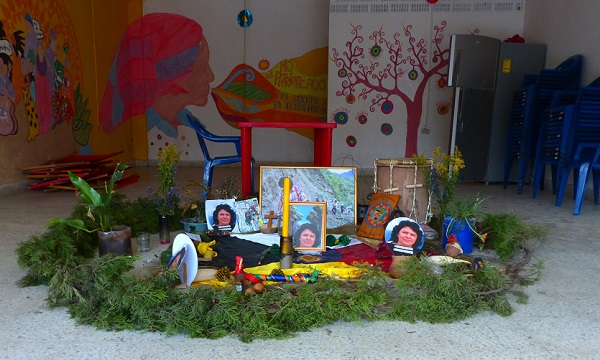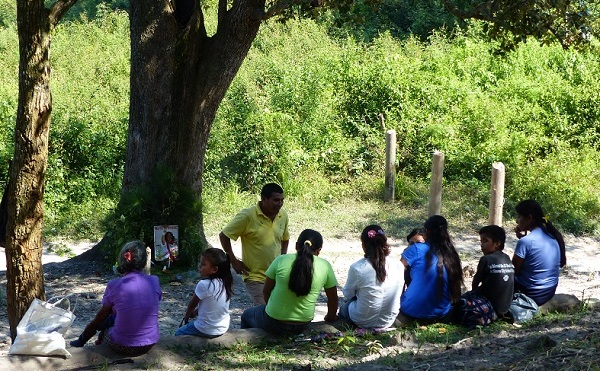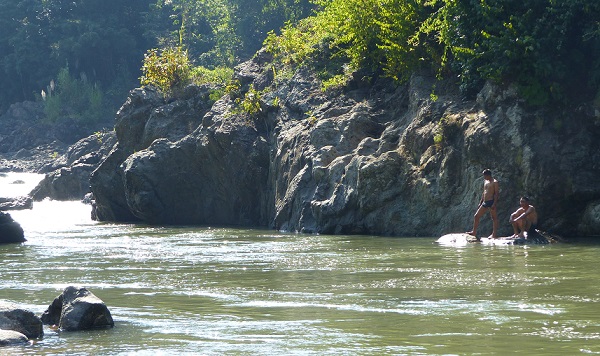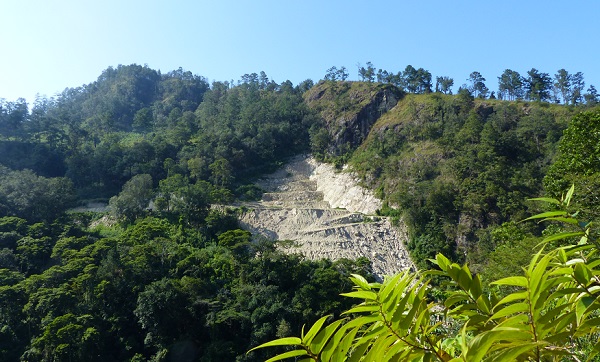Honduras: A free river makes the heart happy
Last month I visited COPINH in Honduras. I stay in their house where I've been before. It has changed.The walls are decorated with colourful paintings, and there are altars for Berta Cáceres, their former leader who was murdered in March 2016. Instead of a simple fence, the building is now being protected by a thick wall with barbed wire. There are security camera's everywhere.

Memorial altar for Berta Cáceres in COPINH's office
The next few days, I will talk to the members of COPINH and visit Rio Blanco the community where the controversial Agua Zarca dam* is being build.
Resistance underneath the oak
Early in the morning I leave for Rio Blanco. A large group of people is waiting for me underneath 'the oak'. Here in 2013, the community blocked the road towards the river, forcing the company to construct the dam from the other side of the river. From the hilltop we look over the green fields and the forested hills. One of the community's elders has constructed a little altar for Berta. Several community members hold a speech.

Meeting underneath the oak
The dam has led to rising unrest in the community. Maria explains: "Before the company came, the community was so beautiful and precious. There was no risk to get killed, we could sleep outside." The murdering of their leader Berta has convinced the community members even more: "Berta lost her life in the fight for our territory, for life, now she has become a guardian of the river." Lucio, one of the local leaders, expressed the militancy of the community: "It doesn't matter if they kill us, we will not give up until we have defended our rights. We disagree with whatever plan they [the banks] have, because they have proven to be liars."
A free river makes us happy
I stay an afternoon and the night in Rio Blanco. With some village boys I descend to the river. During the walk, they are shy and quiet. We cool of in their magical river and climb on a rock in the middle. Then they start talking: about how much they like swimming in the river, about the good corn harvest, about Berta, about all international visitors they have already received in their community. We laugh and we dive off the higher rocks. When we dress ourselves and walk up again, the silence returns.

Swimming in the magical river
The Lenca people are living in close connection to the nature that surrounds them. To understand what 'defending the territory' means to them, you have to be there, swim in the river, stroll through the corn fields, see the clear starry sky and witness rituals along the river banks on your bare feet. One of the older community members explains why he is fighting the dam: "A free river makes the heart happy." Now how do you explain that to people whose only understanding of 'development' is in terms of economic development, of money and profit?
COPINH and the fight against 'green capitalism'
Back in the office of COPINH in Intibuca, I speak with the daughter of Berta Caceres. After the murder of her mother, Bertita (she was named after her mother) interrupted her studies to support COPINH. Bertita grew up with her mother's the struggle, as previously her sister Laura explained to us. The loss of Berta is difficult for COPINH, it is an emotional shock, they lost their strong, inspiring leader while at the same time the international attention and pressure increased. In the Honduran media COPINH is constantly being criminalized, and local leaders are regularly threatened with death.
Rio Blanco is not the only place that is threatened by a project. Within the Lenca territory, 49 concessions have been issued without the consent of the communities, almost all of them dams and wind farms for 'green' electricity. Bertita explains that COPINH sees this as 'green capitalism': "Covered by nice words, the exploitation and expropriation of our land continues, in a more advanced, better prepared way. But as long as our rights are not being respected, as long as our voice is not being heard, they can promise whatever they want: we will not accept their projects."
No more confidence
The struggle against the Agua Zarca dam is a symbolic struggle. In January 2016, Berta Cáceres told me: "If we can't stop this dam, we can't stop nay other project." And while FMO is looking for a responsible way to withdraw from the project, Bertita explains to me how difficult is has become for COPINH to believe them: "Already in 2014 we sent letters to FMO, they knew what was happening and they never did anything, until their reputation was at stake." I also talked with Tomas Membreño, Berta's successor as the new coordinator of COPINH. He has a clear message to FMO: "We want them to pack their bags and leave. Today."

Construction works for the dam on the other side of the river
* About Berta Cáceres and the Agua Zarca dam:
In March 2016, human rights activist Berta Cáceres was murdered in Honduras. She was the coordinator of the indigenous organization COPINH and fought for the rights of the indigenous Lenca people in Honduras. One of the major conflicts in which Berta was involved is the construction of a dam in indigenous territory, Agua Zarca, where also the Dutch development bank FMO is involved.
FMO entered into the Agua Zarca project in 2013. Berta repeatedly sent letters to ask FMO to withdraw their investments, because according to her indigenous rights were violated and the project did not benefit local communities. After Berta was murdered, FMO suspended its investments in the project. Since then, FMO is looking for a responsible way to definitively step out of the project.
The conflict around Agua Zarca is complicated. There are also local communities that say to have benefited from the construction of the dam. However, from the start of the project the opposition to it was not taken seriously. In the Honduran context of violence, corruption and impunity this has led to this conflict, in which companies, governments and banks have much more power than local communities who defend their rights. Both ENDS is committed to these people who defend their rights and supports COPINH to influence FMO.
Also read:
- 7 February 2017: Interview with Tomas Gomez Membreño from COPINH
- 20 October 2016: Interview with Laura Cáceres
- 30 September 2016: New report: lenders should exit from Agua Zarca project
- 13 May 2016: Arrest of DESA staff member for murder of Berta Cáceres seems last straw for FMO
- 16 March 2016: FMO's suspension of activities in Honduras is just a first step
- 5 March 2016: Brave human rights defender Berta Cáceres murdered
Read more about this subject
-
 Dossier /
Dossier /Agua Zarca: indigenous fight against dam costs lives
Indigenous Hondurans are resisting the construction of the Agua Zarca hydrodam. Their fight has cost several lives, including that of Berta Cáceres. After considerable public pressure, Dutch development bank FMO withdrew from the project.
-
 Blog / 11 December 2025
Blog / 11 December 2025Reflections on working on Dutch finance for Mozambique LNG
Last Tuesday, I received a short text message with big news: the minister had just announced that the financing policy for the Mozambique LNG project was stopped. It was a decision that I – along with so many others – have fought for for years. Only now, more than a week later, it is slowly sinking in that we have really won. The years of perseverance, frustration, discussions and investigations have finally led to this result. It still feels a bit surreal.
-
 Dossier /
Dossier /Global Alliance for Green and Gender Action (GAGGA)
GAGGA rallies the collective power of the women's rights and environmental justice movements to realize a world where women can and do access their rights to water, food security, and a clean, healthy and safe environment.
-
 Dossier /
Dossier /Fair Green and Global Alliance (FGG)
Together with civil society organisations from all over the world, the Fair Green and Global (FGG) Alliance aims for socially just, inclusive and environmentally sustainable societies in the Netherlands and the Global South.
-
 Dossier /
Dossier /Advocating for responsible policies of development banks
Development banks should comply with strict environmental and human rights rules to ensure that their projects benefit and do not harm the poorest groups. Both ENDS monitors the banks to make sure they do.
-
 Blog / 11 April 2025
Blog / 11 April 2025FMO is very pleased with its own success – now the local population still needs to be
The FMO development bank is proud of its results and the opportunities it seizes where commercial banks fail to act. But do the bank's actions really help, ask Anne de Jonghe and Nick Middeldorp.
-
Letter / 22 July 2024
Joint Call to Action: International Civil Society Demands Justice for Berta Cáceres' Murder Victims in Honduras
This is a joint call to action by international civil society organizations to call upon the Honduran authorities to ensure there is justice for the victims of the murder on Berta Caceres. Eight years and four months have passed since the crime against Berta and the Honduran justice system has not confirmed the sentences of those convicted and has not prosecuted the intellectual authors. We are extremely concerned that independent administration of justice and international agreements on human rights are not being upheld.
-
 News / 2 April 2024
News / 2 April 2024The Climate lawsuit against Shell
Milieudefensie (Friends of the Earth Netherlands) and 6 other organisations are confidently heading into Shell’s appeal of the 2021 climate ruling, which will take place on April 2nd in The Hague. In the landmark lawsuit against the oil and gas company, the court decided that Shell must slash its CO2 emissions by 45%, in line with international climate agreements.
-
 Dossier /
Dossier /Large-scale infrastructure
Large-scale infrastructural projects have detrimental effects on local people and the environment, while their benefits are felt elsewhere. Both ENDS is working to ensure that local people have a greater say in decision-making and is investigating the way these projects are funded.
-
 News / 28 June 2022
News / 28 June 2022In solidarity with daughter of murdered Indigenous leader
On Tuesday 28 June, the Honduran organisation COPINH and the Global Justice Association filed a complaint with the public prosecutor in the Netherlands against Dutch development bank FMO. For COPINH, this is part of their continued efforts to bring to justice those involved in the murder of their leader Berta Cáceres. FMO financed the Agua Zarca project in Honduras in 2014. The new complaint is based on documents indicating that FMO's money has been used improperly.
-
 News / 23 December 2021
News / 23 December 20212022 is the year for FMO to make good on its promises and provide financial support only to sustainable development
2021 was a turbulent year for Dutch development bank FMO, to say the least. The bank has been under fire for many years for investments linked to human rights violations and suspected corruption. But in the past year, the Dutch press and media have reported on one new development after the other in ongoing cases involving FMO. Below we give a short summary of these cases and call on FMO to make the promised improvements in 2022.
-
 News / 23 July 2021
News / 23 July 2021Dutch development bank FMO's funding for Agua Zarca project possibly linked to malpractices
The million-dollar loan that the Dutch development bank FMO provided to project developers of Honduran company DESA for the construction of the controversial Agua Zarca dam project in Honduras, may be related to gross corruption and malpractice. This is concluded in an article published today in the Dutch news paper Financieel Dagblad, based on information provided by COPINH, the indigenous organisation that has been opposing the construction of the dam for years. Several members of the organisation, including its leader Berta Cáceres, were murdered. DESA director David Castillo has recently been convicted of being involved in the assassination of Cáceres in 2016.
-
 News / 2 March 2021
News / 2 March 20215 years after her murder, Berta Cáceres’ family is still waiting for justice
Today it is 5 years ago that Berta Cáceres was shot in haar home in La Esperanza, Honduras, for defending the rights of indigenous people. The leader of indigenous organisation COPINH resisted the Agua-Zarca hydropower dam that was planned to be build in indigenous territory. The actual murderers have been convicted, but not so the intellectual authors of the murders.
-
 News / 10 July 2020
News / 10 July 2020Honduran NGOs call on FMO not to invest in controversial bank
Dutch development bank FMO is considering investing in the controversial Ficohsa bank in Honduras. The bank has close ties with the elite in Honduras, which holds considerable power in politics, the (para)military and the business community. Last Wednesday, a number of Honduran organisations, including the indigenous organisation COPINH – whose leader Berta Cáceres was murdered in 2016 – sent a letter to the FMO management. The letter, signed by forty organisations including Both ENDS, calls on FMO not to do business with this bank.
-
Letter / 7 July 2020
Public letter to urge FMO not to provide a new loan to FICOHSA
A number of Honduran organisations sent a letter to the FMO management to call on FMO not to do business with Honduran bank FICOHSA. The bank has close ties with the elite in Honduras, which holds considerable power in politics, the (para)military and the business community.
-
 Blog / 30 April 2020
Blog / 30 April 2020Discovery of gas in Mozambique: blessing or curse?
COVID-19is placing our economy under a magnifying glass. Now that a large part of global trade has come to a standstill, the tension between international economic activity and local well-being is becoming more visible. That is very clear in northern Mozambique, where one of the world’s largest gas fields was discovered in 2011. Dutch companies are investing in the processing and transport of the gas.
-
 News / 16 December 2019
News / 16 December 2019Seven men sentenced to long prison terms for the murder of Berta Cáceres
Earlier this month, the seven men found guilty of the murder of Berta Cáceres were sentenced to jail for periods between 30 and 50 years. The court confirmed its opinion that Berta Cáceres was murdered for her role in defending the rights of the indigenous Lenca communities.
-
 External link / 29 May 2019
External link / 29 May 2019Women’s leadership in restoring ecosystems through analog forestry (Annual Report 2018)
Due to their role as environmental leaders, women are key actors in restoring degraded ecosystems. Within the Global Alliance for Green and Gender Action (GAGGA), we work with local women's groups to promote the use of Analog Forestry.
-
 News / 1 December 2018
News / 1 December 20187 suspects of the murder of the Honduran Berta Cáceres were found guilty
On Thursday, November 29, seven suspects of the murder of Berta Cáceres (in March 2016) were found guilty. Members of the indigenous human rights organisation COPINH, of which Cáceres was the leader, and close relatives of Cáceres herself see the ruling as the first step towards justice for her murder and the recognition that the company DESA is co-responsible for this. They also point out, however, that the process was permeated with corruption, intimidation and other abuses from the very beginning, and that the masterminds behind the murder are still walking around freely.
-
 Blog / 13 November 2018
Blog / 13 November 2018The "Dutch hero" came to develop "poor Africa"
Last weekend there was an article in Dutch newspaper De Volkskrant about the Lake Turkana Wind Power Project in Kenya. I was surprised and angry about how the story was presented. How can people be so blind to the perspectives of others? And how can a progressive paper like De Volkskrant devote so much space to such an unnuanced account? This is exactly why such projects lead to conflicts.




